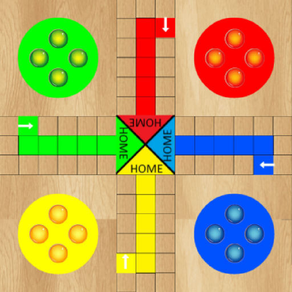
Ludo Board Game
Free
0.0.1for iPhone, iPad
Age Rating
Ludo Board Game Screenshots
About Ludo Board Game
Pachisi or ludo originated in India by the 6th century. The earliest
evidence of this game in India is the depiction of boards on the caves
of Ajanta.
This game was played by the Mughal emperors of India; and kings of
India. It is said that the Mysore Ruler Customized the game to 6
Players so he could play with his 5 queens together.
Variations of the game made it to England during the late 19th
century. One which appeared around 1896 under the name of Ludo.
The players alternate turns in a clockwise direction.To enter a token
into play from its staging area to its starting square, a player must
roll a 6. If the player has no tokens yet in play and does not roll a
6, the turn passes to the next player. Once a player has one or more
tokens in play, he selects a token and moves it forward along the
track the number of squares indicated by the die roll. Players must
always move a token according to the die value rolled, and if no move
is possible, pass their turn to the next player.
When a player rolls a 6 he may choose to advance a token already in
play, or alternatively, he may enter another staged token to its
starting square. The rolling of a 6 earns the player an additional
("bonus") roll in that turn. If the additional roll results in a 6
again, the player earns an additional bonus roll. If the third roll is
also a 6, the player may not move a token and the turn immediately
passes to the next player.
A player may not end his move on a square he already occupies. If the
advance of a token ends on a square occupied by an opponent's token,
the opponent token is returned to its owner's yard. The returned token
may only be reentered into play when the owner again rolls a 6.
(Unlike Pachisi, there are no "safe" squares on the game track which
protect a player's tokens from being returned. A player's home column
squares are always safe, however, since no opponent may enter them.
Ludo played in the Indian subcontinent features a safe square in each
quadrant, normally the fourth square from the top in the rightmost
column. These squares are usually marked with a star.
The Player whoes all four tokens reach Home Wins!
evidence of this game in India is the depiction of boards on the caves
of Ajanta.
This game was played by the Mughal emperors of India; and kings of
India. It is said that the Mysore Ruler Customized the game to 6
Players so he could play with his 5 queens together.
Variations of the game made it to England during the late 19th
century. One which appeared around 1896 under the name of Ludo.
The players alternate turns in a clockwise direction.To enter a token
into play from its staging area to its starting square, a player must
roll a 6. If the player has no tokens yet in play and does not roll a
6, the turn passes to the next player. Once a player has one or more
tokens in play, he selects a token and moves it forward along the
track the number of squares indicated by the die roll. Players must
always move a token according to the die value rolled, and if no move
is possible, pass their turn to the next player.
When a player rolls a 6 he may choose to advance a token already in
play, or alternatively, he may enter another staged token to its
starting square. The rolling of a 6 earns the player an additional
("bonus") roll in that turn. If the additional roll results in a 6
again, the player earns an additional bonus roll. If the third roll is
also a 6, the player may not move a token and the turn immediately
passes to the next player.
A player may not end his move on a square he already occupies. If the
advance of a token ends on a square occupied by an opponent's token,
the opponent token is returned to its owner's yard. The returned token
may only be reentered into play when the owner again rolls a 6.
(Unlike Pachisi, there are no "safe" squares on the game track which
protect a player's tokens from being returned. A player's home column
squares are always safe, however, since no opponent may enter them.
Ludo played in the Indian subcontinent features a safe square in each
quadrant, normally the fourth square from the top in the rightmost
column. These squares are usually marked with a star.
The Player whoes all four tokens reach Home Wins!
Show More
What's New in the Latest Version 0.0.1
Last updated on Feb 6, 2015
Version History
0.0.1
Feb 6, 2015
Ludo Board Game FAQ
Click here to learn how to download Ludo Board Game in restricted country or region.
Check the following list to see the minimum requirements of Ludo Board Game.
iPhone
iPad
Ludo Board Game supports English































